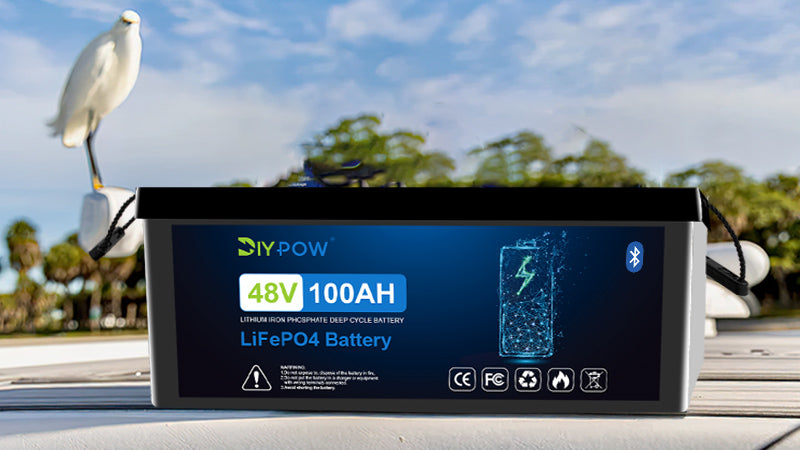As the golf cart industry continues to evolve, battery technology has emerged as a game-changer, revolutionizing the performance and capabilities of these vehicles. Among the various battery options available, lithium batteries have garnered significant attention for their ability to enhance the overall efficiency and power of golf carts. In this article, we will explore the importance of lithium batteries, their advantages over traditional lead-acid batteries, and the factors that influence the number of lithium batteries required for a 48v golf cart lithium battery conversion kit.
The Emergence of Battery Technology in the Golf Cart Industry

Over the years, golf carts have evolved from simple utility vehicles to sophisticated machines that offer enhanced functionalities and performance. One crucial aspect of this advancement is the utilization of advanced battery technology. With the advent of lithium batteries, golf carts have experienced a significant boost in power, range, and overall efficiency. These batteries have become a popular choice among golf cart manufacturers and owners due to their exceptional characteristics.
Importance of Lithium Batteries for Enhanced Performance

Lithium batteries have become synonymous with improved performance in the golf cart industry. Unlike traditional lead-acid batteries, which have inherent limitations and drawbacks, lithium batteries offer numerous advantages that directly translate into better performance on the green. From longer driving range and increased top speed to reduced weight and improved energy efficiency, lithium batteries provide golf cart users with a superior experience.
Understanding the Basics of a 48V Golf Cart

Before delving into the specifics of best 48v lithium battery for golf cart, let's briefly explore the foundational understanding of this type of golf cart. A 48V golf cart operates using a 48-volt electrical system, which allows for heightened power and performance. This system consists of various key components, each serving a specific function to ensure smooth operation and efficient utilization of power.
Perfect for Golf Cart Batteries

Diypow 48 volt golf cart batteries can be used to replace worn-out or dead batteries in many other brands of golf carts. They are excellent lithium batteries for EZGO 48-volt golf carts, but will also work well with other brands of 36V golf carts such as Star EV, Polaris, Taylormade/Taylor Dunn, Club Car, Yamaha, and more.
Key Components and Their Functions
●Motor Controller: The motor controller regulates the power flow from the batteries to the electric motor, ensuring optimal performance and efficiency.
●Electric Motor: This component converts electrical energy into mechanical energy, propelling the golf cart forward.
●Batteries: At the heart of the electrical system, batteries store the energy required to power the electric motor and other electrical components.
●Wiring Harness: The wiring harness provides the necessary connections between the batteries, motor controller, and electric motor, enabling the flow of electricity.
●Charger: The charger replenishes the energy in the batteries, allowing for extended use of the golf cart.
Factors Affecting Battery Requirements

Determining the number of 48v golf cart batteries depends on various factors that influence the power consumption and performance of the vehicle. These factors include:
Weight of the Golf Cart and Additional Accessories
The weight of the golf cart itself, along with any additional accessories such as upgraded seating, entertainment systems, or storage compartments, can impact the power requirements. Heavier carts may require more lithium batteries to provide sufficient power to propel the vehicle and operate the additional features.
Terrain and Elevation of the Golf Course
The terrain and elevation of the golf course play a crucial role in power consumption. Hilly courses or courses with challenging landscapes may require additional power to navigate efficiently. Understanding the specific demands of the golf course will help determine the number of lithium batteries needed.
Calculating Power Consumption
Estimating the power requirements for a 48V golf cart involves carefully considering various factors that contribute to power consumption. By examining these factors, golf cart owners can determine the optimal number of lithium batteries needed for their specific situation.
Factors to Consider When Determining Power Consumption

●Motor Efficiency: The efficiency of the electric motor plays a significant role in power consumption. Higher-efficiency motors will require less power and, therefore, fewer batteries.
●Terrain Characteristics: The type of terrain, such as uphill or rough terrain, impacts power requirements. Steeper inclines and challenging surfaces will demand more power from the batteries.
●Speed: The desired speed of the golf cart affects power consumption. Higher speeds generally require more power to sustain, influencing the number of lithium batteries needed.
●Accessories and Features: Additional accessories, such as headlights, audio systems, or refrigerators, draw power from the batteries and must be taken into account when calculating power consumption.
Evaluation of Lithium Battery Chemistry
Not all lithium batteries are created equal, as different chemical compositions offer varying performance characteristics. When considering48v lithium golf cart battery, it is essential to evaluate different lithium battery chemistries to determine which best suits the intended purpose.
Comparing Different Lithium Battery Chemistries
●Lithium Iron Phosphate (LiFePO4): LiFePO4 batteries are known for their safety, long lifespan, and stable performance, making them a popular choice for golf cart applications.
●Lithium Nickel Cobalt Aluminum Oxide (NCA): NCA batteries offer high energy density and power performance, making them suitable for users seeking maximum power output.
●Lithium Nickel Manganese Cobalt Oxide (NMC): NMC batteries strike a balance between energy density and power output, making them a versatile option for various applications.
Which Chemistry Best Suits a 48V Golf Cart?
The battery chemistry that best suits a lithium golf cart batteries 48v depends on the specific requirements and priorities of the user. For those seeking a balance between safety, lifespan, and performance, LiFePO4 batteries are often the preferred choice. However, users who prioritize maximum power output may opt for NCA or NMC batteries.
Optimal Battery Arrangement
The arrangement of lithium golf cart battery 48v electrical system can impact performance and efficiency. Two common arrangements, series and parallel configurations, have unique pros and cons.
Series or Parallel Configuration: Pros and Cons
●Series Configuration: In a series configuration, batteries are connected in a series, with the positive terminal of one battery connected to the negative terminal of the next. This arrangement increases the overall voltage output of the battery bank. Pros of a series configuration include enhanced power output and higher voltage, enabling faster speeds and increased torque. However, series configurations require balanced battery capacities and can suffer from reduced usability if one battery fails.
●Parallel Configuration: A parallel configuration connects multiple batteries side by side, with all positive terminals connected together and all negative terminals connected together. This setup increases the overall battery capacity while keeping the voltage output constant, allowing for extended driving ranges. Pros of a parallel configuration include improved battery capacity and redundancy, ensuring continued usability even if one battery fails. However, a parallel configuration may reduce the speed and torque potential of the golf cart.
Determining the Most Efficient Arrangement for a 48V System
Determining the most efficient battery arrangement for a 48V system requires considering the desired balance between power output, battery capacity, and system redundancy. Golf cart owners should evaluate their specific requirements and consult with professionals to select the optimal arrangement that aligns with their priorities.
Safety Measures and Considerations
While lithium batteries offer numerous advantages, it is crucial to adhere to proper safety measures when handling and using them in golf carts. Following safety guidelines is essential to prevent accidents and ensure the well-being of golf cart owners and users.
Safety Precautions for Handling Lithium Batteries
●Avoid exposing lithium batteries to extreme temperatures or direct sunlight, as this can cause damage or reduce battery performance.
●Handle lithium batteries with care, avoiding physical shocks or impacts that can lead to internal damage.
●Store lithium batteries in a cool, dry place, away from flammable materials or direct heat sources.
●Follow manufacturer instructions for charging and maintenance procedures to ensure safe
operation.
Ensuring Safe Usage and Preventing Accidents
To ensure safe usage and prevent accidents, golf cart owners must adhere to these safety considerations:
●Use batteries specifically designed for golf cart applications and follow recommended voltage and capacity ratings.
●Inspect batteries regularly for signs of damage, leaks, or swelling, and replace any faulty or damaged batteries promptly.
●Maintain proper charging techniques, avoiding overcharging or rapid charging methods that can reduce battery life or cause safety hazards.
Cost Analysis: Lithium Batteries vs. Lead-Acid Batteries
Considering the upfront costs and long-term savings is crucial when comparing lithium batteries to lead-acid batteries for golf carts.
Upfront Costs and Long-Term Savings of Lithium Batteries
While lithium batteries generally have higher upfront costs compared to lead-acid batteries, their longer lifespan, reduced maintenance requirements, and increased energy efficiency result in significant long-term savings. Golf cart owners should analyze the total cost of ownership over the projected lifespan of the batteries to make an informed decision.
Comparing the Total Cost of Ownership for Different Battery Options
When comparing the total cost of ownership for lithium batteries and lead-acid batteries, several factors need to be considered:
●Initial purchase cost
●Lifespan and replacement frequency
●Maintenance expenses
●Energy efficiency and charging costs By evaluating these factors, golf cart owners can determine which battery option offers the best overall value.
Environmental Impact and Sustainability
The choice of battery for golf carts can have a significant impact on the environment. By selecting lithium batteries, golf courses can contribute to sustainability efforts and reduce their carbon footprint.
Assessing the Environmental Benefits of Lithium Batteries
Lithium batteries offer several environmental benefits, including:
●Lower greenhouse gas emissions compared to lead-acid batteries during production and usage.
●Reduced reliance on traditional fossil fuel-powered golf carts, leading to a decrease in air and noise pollution.
●Longer lifespan and lower replacement frequency, resulting in reduced battery waste.
How Golf Courses Can Promote Sustainability Through Battery Choices?
Golf courses can promote sustainability and environmental consciousness by opting for lithium batteries and implementing proper battery recycling initiatives. Choosing lithium batteries demonstrates a commitment to reducing environmental impact and embracing forward-thinking technologies.
Summary and Key Takeaways
In conclusion, the selection of lithium batteries for a 48v golf cart battery offers unparalleled advantages over traditional lead-acid batteries.